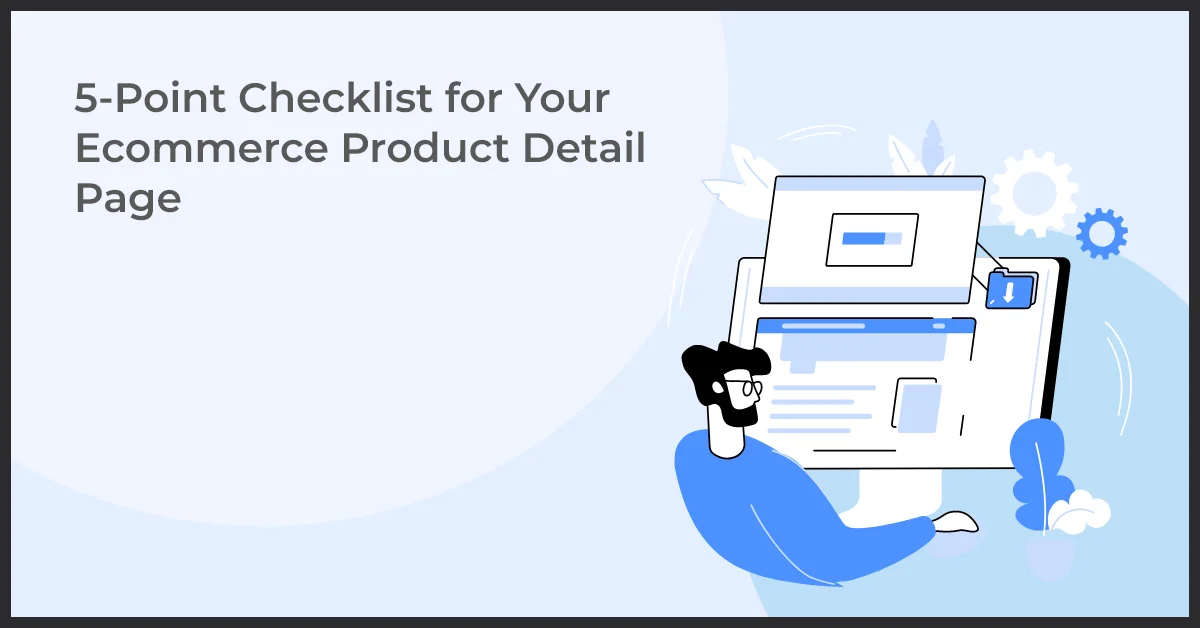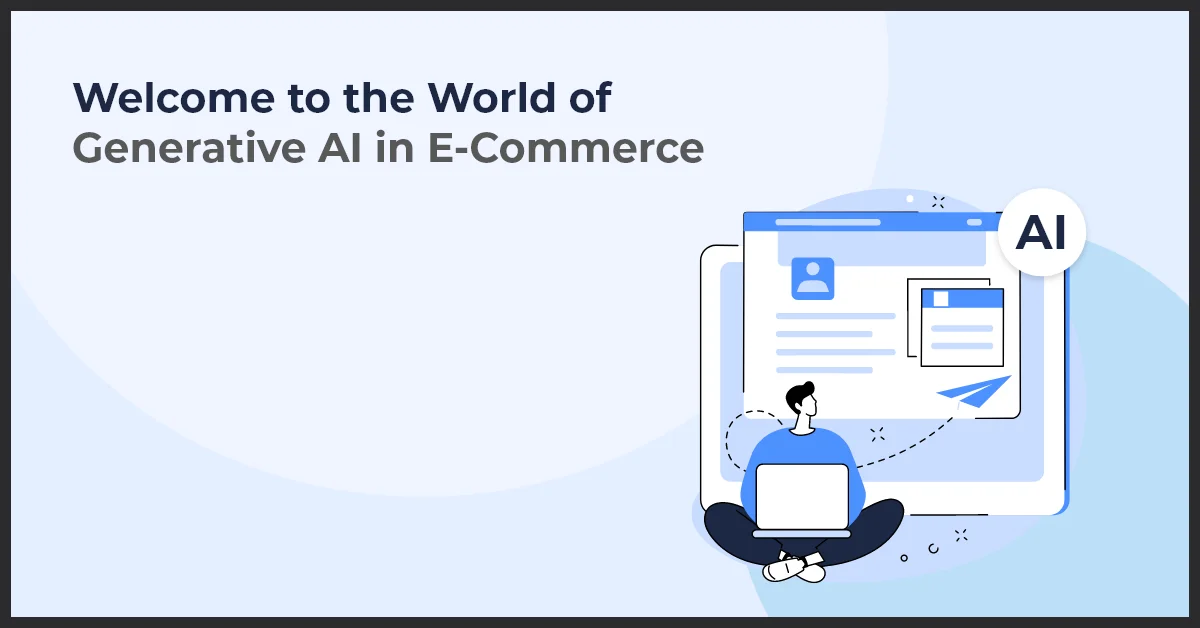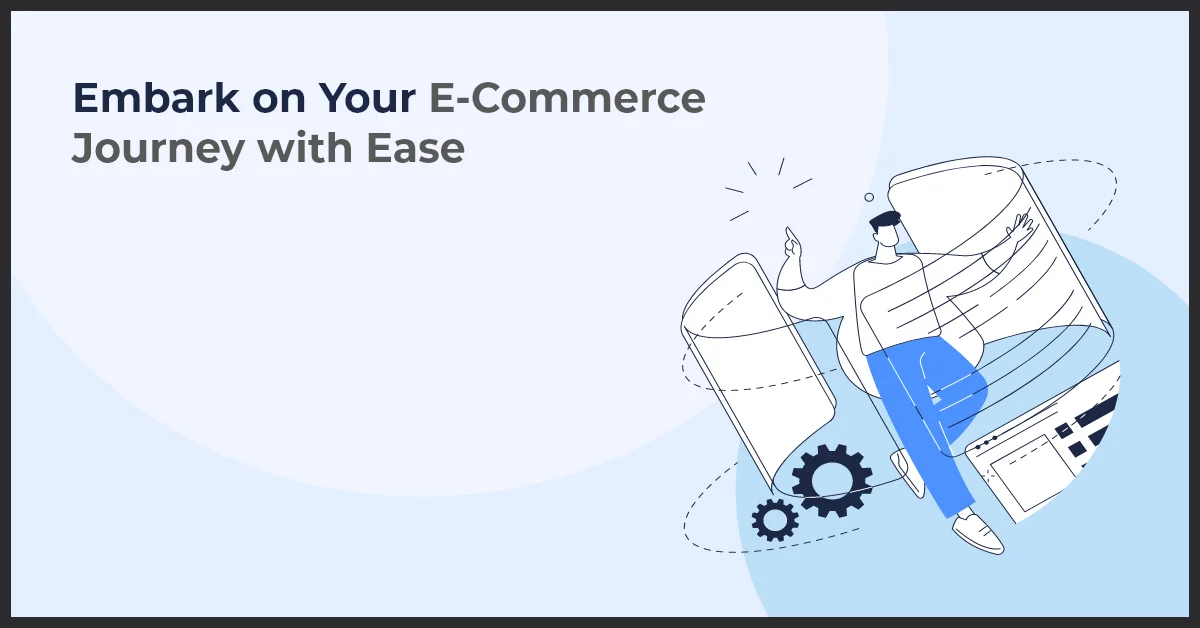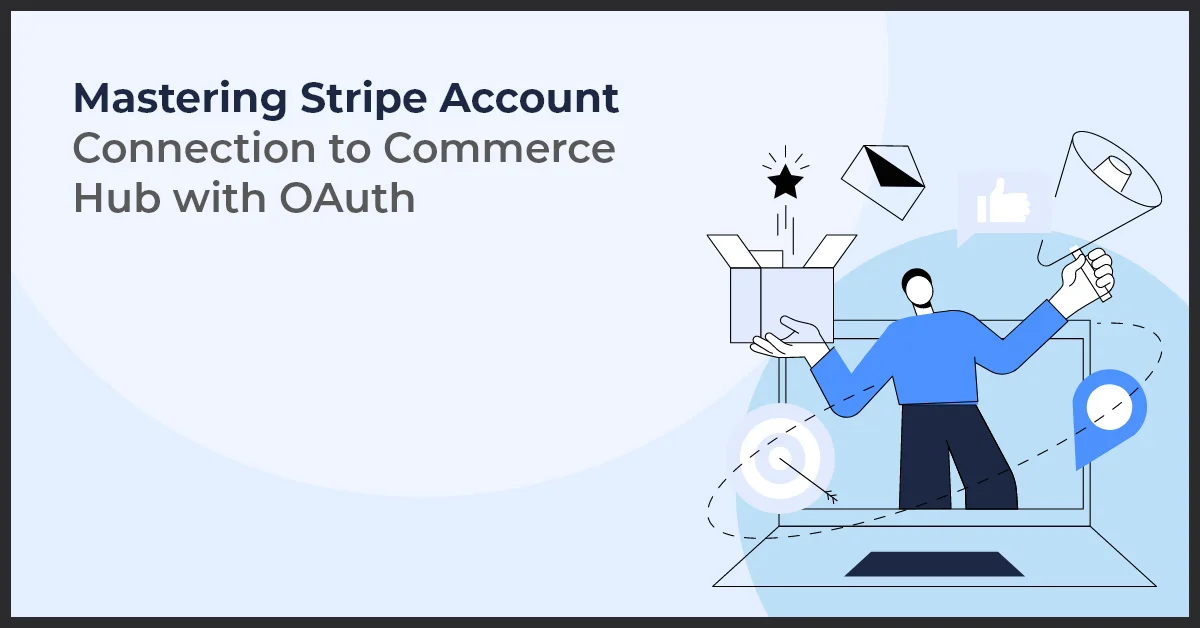9-Point Checklist for Your Ecommerce Product Detail Page

Published on: December 8, 2020
Updated on: June 26, 2024
609 Views
- Ecommerce
16 min read
“In the modern world of business, it is useless to be a creative, original thinker unless you can also sell what you create.”
– David Ogilvy, co-founder of Ogilvy & Mather
Have we ever thought of how difficult it was for top ecommerce websites to initially start the ecommerce business? They must have faced many failures and setbacks; however, once they cracked the code of success, they were unstoppable.
It is not rocket science to create a successful ecosystem for ecommerce business. Let us explore some of the important features of an ideal ecommerce product detail page.
Think your product images don't make that big of a difference? Think again! In the bustling realm of ecommerce, the visuals on your product detail page are not just mere decorations; they're the heart of user engagement and the building blocks of consumer trust. With our easy-to-follow checklist, you'll master the art of capturing and displaying images that captivate. Discover the best practices that lead to those crisp, clear, and irresistibly clickable pictures. Plus, we've got you covered on all the essential angles and shots your product deserves. Are you ready to turn your product detail page into a visual feast that boosts conversions? Let's dive in and start polishing that digital storefront to perfection!
Gallery or Product Photos and Videos
Gallery or product pictures play an important role in getting more customers onboard.
No less than 67 percent of consumers find product images as a more important factor than product descriptions or reviews when it comes to influencing their buying decision.
Since hands-on experience of products is not possible over ecommerce platforms, companies have learned the art of using product images as an important tool in attracting more customers.
But what they must remember is that these images on the ecommerce product detail page should be a particular way.
Some of the important features that can enhance the product image experience of customers over the web are listed below:
1. Showcasing the product as a solution
If our product serves a specific purpose, like a hair straightener or a hiking accessory, it's time to show the audience how it can be used. By using product images on the ecommerce product detail page to show customers its complete functionality, we can engage them at a deeper level. They gain a better understanding of how to use it and quickly learn the advantages of our product. They visualize themselves using the product for their own use.
If we have the resources, product demonstration videos are a worthwhile investment. Our audience will find great inspiration to buy the products if we can show them product videos. We should ask ourselves the questions below to have more idea about how to use images.
- What is the best size for ecommerce product images?
- What’s the ideal file size to maintain good load times for the ecommerce product detail page?
- What file types are best to use?
- Which images are you going to provide for thumbnails?
- What type of images do you need to optimize a category page and an individual ecommerce product detail page?
a. Using a 360 degree or a 3D Image
We should try and use a 360-degree image or a 3D image to give more clarity about the visuals of the product.
A customer will have a better understanding about the product and its features. Apart from that, the ecommerce product detail page also looks more vibrant and modern when you use a 3D image.
b. Zoom functionality
It is important that potential customers can zoom-in on the item to see the areas that they might be interested in. Adding zoom to your ecommerce product detail page is worth it as it means a lot to your customers. Whether your site has a zoom plugin or not, be sure to show multiple ‘zoomed in’ product images, including shots that reveal the most important details of the product. For example, a Coach bag on the website will look more appealing if the visitor can zoom in and feel the original texture and fabric.
c. Unboxing Videos
Videos showcasing how to unbox a product are extremely popular these days simply because they are more visually appealing to the customers.
For example, customers get a nice feel about opening a new mobile phone from its box and getting a closer look about all the accessories inside the box. Unboxing a new product gives a new kind of experience to the customer.
d. User generated images
If we can get good quality user generated images it can work as a good testimonial for the potential buyers. They will be able to see the real product without any filtered representation.
2. Providing a clear product overview
Providing a clear-cut product overview makes it easier for the audiences to take a quick decision about making a purchase or not. An ecommerce product detail page overview should have the elements listed below:
a. Ecommerce Product Detail Page Title
Our product page title should include brand name, product version, size/dimension, and color. At the same time important keywords should also be used while writing on the product title.
As an example, if we are selling men’s sneakers, the product title should look something like this: Nike Black Size 14 Men’s Sneakers. This is a very distilled version of how it should look, and we should keep in mind that an exceptionally long title gets more ignorance from the customers. Ideally titles should not be more than 200 characters.
b. Price
Product price should be indicated properly on your ecommerce product detail page along with the CTA (call to Action) button and the geo currency updater should be installed so that the buyer gets to know the exact price along in the local currency. If any discount is offered over the sales price, a clearly indicated subsidized price should be written.
c. Features
Product features should be explained properly below the CTA under the product description menu. If we can explain what all benefits the product is going to serve, there are more chances of the product getting picked up by the customer.
d. Customization options
Any customization available with the product should be highlighted and the customized product visuals should be showcased on the product sales page. Many times, we may win a client just because the product customization appeals more to the customer.
e. Call To Action (CTA)
CTAs are the buttons throughout a site that tell your customers what to do, where to click and what to buy. Having a clear call-to-action on every ecommerce product detail page allows you to steer the customer toward the most appropriate spot in your conversion funnel.
CTA is the most important feature of the product sales page which helps the seller and buyer to complete the transaction over the web. The CTA drives the customer to move further down the sales funnel and close the deal by agreeing to pay the sales price. Placement of CTA over the ecommerce product detail page is the most important factor in every ecommerce business.
3. Include social proof
Social proof is customer reviews generated by the customers themselves. We should always give space to our customers to share their feedback and ability to express liking and disliking of our products. New customers feel more secure buying a new product for the first time if they find more people buying it. Even a negative feedback can be managed tactfully and can help convert more customers.
4. Similar product suggestions
Incremental sales is always welcomed and cross selling tactics always pay well if implemented smartly. Cross selling on ecommerce portals can be done by providing information on what other people are buying along with the main product purchased. It is believed that this type of cross selling.
5. Human interaction for any help or guidance needed
If we can provide a live chat solution on the sales page by the producer or the seller, our customers will be able to clear any doubts in a real fast manner and their buying decision process will also get faster. Chatbots are available very easily these days and can be useful in winning deals delayed at a crucial juncture.
6.Crafting Detailed Product Descriptions
Let’s chat about the heart of your product detail page—the descriptions. Picture this: a potential customer has landed on your page. They can't touch or test your product, but with the right words, you can paint a vivid picture and provide the assurance they need to click 'Add to Cart'. Crafting a detailed product description is more than just listing features; it’s about bringing your product to life.
Importance of Accurate and Thorough Descriptions for Customer Reassurance
The key to a great product description is accuracy and detail. Think of yourself as an online personal shopper. You want to give customers every piece of information they'd ask for if they were holding the product in their hands. This isn’t only about avoiding returns but also about building trust. Your customers need to feel confident that what they see is what they'll get.
How to Write SEO-Friendly Product Content
Let's not forget our friend, SEO. When writing descriptions, sprinkle in keywords that are relevant to your product—but keep it natural. Avoid keyword stuffing; instead, aim for a clear, readable text that just happens to include the terms people search for. And remember, a well-crafted product title is just as crucial for SEO as it is for grabbing customer attention.
Balancing Technical Details with Persuasive Sales Copy
Now, for the tightrope walk: balancing specs with selling points. The trick is to intertwine technical details (like dimensions and materials) with persuasive sales copy that highlights the benefits. Use bullet points to break down the nitty-gritty specs while weaving a story in your main paragraphs about how your product solves problems or improves lives.
Remember, your product descriptions aren't just data. They're part of a larger story about your brand and the experience you're offering. Keep it conversational, as if you’re talking to a friend who's asking for the 411 on your awesome product. Add that personal touch, and watch as click-throughs turn into conversions.
7. Providing Up-to-date Price and Discounts Information
One of the key elements of a successful ecommerce product detail page is ensuring that customers have access to the most current pricing and discount information. Transparency in pricing doesn’t just help avoid confusion - it's also a significant trust-builder that can influence purchasing decisions. Let's explore some tactics to keep your customers in the loop effectively.
Transparency in Pricing as a Trust-Builder
Customers appreciate honesty, and nothing says upfront like transparent pricing. Clear, concise, and consistent information about the cost of products sets the right expectations and aids in a hassle-free shopping experience. Here's a simple checklist to ensure price transparency:
- Ensure that any additional fees or charges are mentioned clearly
- Include a price breakdown if multiple items or services are involved
- Update the pricing information in real-time to reflect any changes or promotions
Strategies for Highlighting Discounts
Everybody loves a good deal! Highlighting discounts and special offers can encourage more sales and increase the perceived value of the purchase. Here are a few strategies:
- Use striking visuals to draw attention to discounts and offers
- Compare the discounted price with the original price to showcase the savings
- Use urgency-driven language, such as 'limited-time offer,' to encourage quick action
Dynamic Pricing and Its Impact on User Behavior
Dynamic pricing is a strategy ecommerce platforms use to adjust prices on the fly based on market demand, competition, and other factors. This approach can profoundly impact user behavior:
- Customers may act quickly if they believe a price is the best offer at that moment
- It can create a sense of excitement and engagement, as users feel they're getting an exclusive deal
- However, ensure that these price changes are not abrupt or misleading, as they can also lead to mistrust
Maintaining up-to-date and transparent pricing and discount information is not just beneficial for the trustworthiness of your store. It also directly impacts purchasing decisions, making it a critical factor for conversion optimization on your product detail page.
8. Keeping Customers Informed on Availability and Stock Levels
Staying transparent about your product’s availability is not only helpful—it’s essential for maintaining a good relationship with your customers. Nobody likes to find out at checkout that the item they were excited about is actually out of stock. Let's explore how we can master real-time inventory notifications and other strategies to keep your customers well-informed and happy to shop.
Real-time Inventory Updates and Their Importance in User Experience
Nothing beats the efficiency of real-time inventory updates when it comes to enhancing user experience. Users rely on accurate stock information while they're shopping, and ensuring they have the most current data at their fingertips can eliminate frustration and build trust. It's a direct pathway to a seamless shopping experience that encourages customers to return.
Handling Out-of-Stock Items Without Losing Sales
Now and then, popular items will run out of stock— it's an inevitable part of retail. But there's a strategy to handle this without disappointing your customers or losing potential sales. Offering the option to "Notify Me When Available" or displaying related products can keep the momentum going. Transparency about restocking times can also go a long way in managing customer expectations.
Preorder Options and Back-in-Stock Notifications
Why miss a sale just because an item isn't currently in stock? Preorder options give your customers the chance to purchase products they want, even if those products are not immediately available. Combine this with an automated "back-in-stock" notification system, and your customers will appreciate the convenience of being kept in the loop. This ease of service emphasizes that you value their business and boosts customer loyalty.
- Real-time inventory updates keep disappointments at bay and customers informed.
- Offering alternatives and transparent communication about out-of-stock items can maintain sales momentum.
- Preorder options and notification services show customers you care about their experience Easy Returns: Peace of Mind with Every Purchase
We understand that sometimes, things don't work out. Maybe the size was off, or it just wasn't what you expected—no worries! That's why we've made sure our return and refund policies are laid out in simple, easy-to-understand terms. We're committed to a hassle-free returns process, because shopping with confidence is shopping with joy.
Clearly Defined Return Information
It's all about transparency. You should never have to scour a website to find out how to return a product. Our return policy is front and center, giving you the details you need without the headache of a treasure hunt. Whether it's a full refund or an exchange, we've got your back.
Simple Language, Stress-Free Returns
Legal jargon can be confusing—that's why we've ditched it. Our policies are written in conversational language, so you'll understand exactly what to do and when. Simplifying the fine print means less worry for you, and a smoother return journey.
Following Industry Standards
Our policies aren't just made up on the fly—we align with industry best practices to ensure that your confidence is never shaken. From the time window for returns to the condition of the items, everything is laid out to match or exceed standard ecommerce protocols. Shop, return, and refund with the assurance that we're doing right by you.
- 30-day returns: Take your time deciding. If it's not perfect, return it within 30 days.
- No restocking fees: Don't worry about additional costs. Returns should be easy and free.
- Prepaid return labels: We provide the label, so returning an item is as simple as printing and shipping.
- and increase the chances they'll wait for your product instead of going to a competitor.
9.Adopting Trust Badges and Security Features
In the digital shopping world, security isn't just a feature—it's a cornerstone. With identity theft and fraud lurking just clicks away, customers need assurance that they're shopping in a safe environment. That's where trust badges and security features make all the difference on your ecommerce product detail page. Let's get into how you can communicate safety and earn customer trust effectively.
Security as a Cornerstone of E-Commerce
Before we talk about what to display, it's crucial to understand why. A secure ecommerce site doesn't just protect your customers; it also shields your business from potential risks and liabilities. It's a win-win scenario where building trust can lead to increased conversions, fewer cart abandonments, and a more robust brand reputation.
Selecting and Displaying Trust Badges on Product Detail Pages
When you're browsing the internet, what makes you feel confident to proceed with a purchase? Those little icons that signal 'secure,' 'encrypted,' and 'protected' play a more significant role than you may think. Incorporating trust badges from recognized security companies can provide that immediate visual cue that says, "You're safe to shop here." Place them strategically on your product detail pages, ideally close to the 'Add to Cart' button or near payment information to optimize their impact.
Regular Security Audits to Keep the Site Safe
But it's not just about slapping on some badges and forgetting about them. Your commitment to security must be ongoing, which means regular security audits are a must. These audits help ensure that all on-site security measures are up to date and capable of thwarting the latest cyber threats. After all, trust isn't just earned once; it's maintained through continuous care and diligence.
- Ensure your site has SSL (Secure Socket Layer) encryption.
- Consider adding two-factor authentication for customer accounts.
- Perform frequent security checks and updates.
- Be transparent about your security practices with your customers.
By adopting these trust badges and security features, you're not just protecting transactions; you're building a relationship with your customer that's based on trust. And in the landscape of ecommerce, that's truly priceless.
There could also be many other elements which may lead to the creation of a perfect ecommerce product detail page but the above-mentioned elements are a must to create an effective ecommerce ecosystem.



